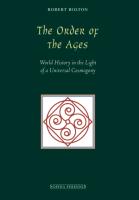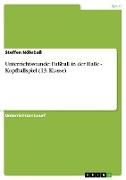The Order of the Ages: World History in the Light of a Universal Cosmogony
BücherAngebote / Angebote:
The laws which relate the modern world to earlier ages, and the position of our own era in a universal time-cycle, are explained in this book in a way which reveals the essential nature of time. It is shown that time imposes patterns of its own on the order of events, which reveal themselves by numerical regularities. By means of a Platonic view of creation, which connects temporal with non-temporal realities, it is shown to be possible to see how man's inner life holds the balance between these two kinds of objective reality.
Traditional cosmological doctrines form the background to the ideas presented, which include insights into the power of universal time to realize evil, and how this can be overcome by those who understand it. Both non-Christian and Early Christian sources are also quoted in this connection, to illustrate the universality of the cyclic idea of time.
Connections are made between metaphysical ideas of time and the scientific idea of entropy and its varied applications. The cyclic idea of time is used to resolve the apparent conflict between the vast tracts of time which have elapsed before Homo Sapiens and the relatively recent appearance of revealed religion.
The last two thousand years are analyzed numerically in terms of traditional cosmology, so as to make it possible to calculate our present position in a universal era, together with the time within which this era will end. Finally, there is a review of the possibility that this ending may coincide with the Last Times, and the implications that this would have for current values and religious beliefs.
'How, when, and why did the world begin? And how will it end? Or is there no ending or beginning? What is infinity, and are such questions merely about illusions? What part does mind play in creation? Are we and the universe programed toward a certain end. . . ? All that can honestly be given in response to such questions is an introduction to that constant and recurrent world-view which this book uniquely provides.'
-John Michell
Christian Platonism has a long and distinguished history, but few orthodox Catholics have tried to make a serious contribution to this tradition in recent times. Robert Bolton's extraordinary book is just such a contribution. Influenced by René Guénon's The Reign of Quantity and the Signs of the Times, and respectful of Tradition, this is a work of great creativity as well as metaphysical intelligence.
-Stratford Caldecott, Chesterton Review, Centre for Faith & Culture, Oxford
Time, like beauty, is one of the foremost mysteries of human experience. Here Dr. Bolton has taken a deliberate and courageous effort to confront the nature of time. It is like a breath of fresh air to see such care taken to present what can authentically be called the traditional view. 'Recurrence' and 'Never Again' are the poles of this mystery so well and ably covered in this book.
Any work that presents the views of such as Plato so well is inevitably going to be of cardinal value-but Dr. Bolton also goes into other wisdom traditions. This may not be easy reading, but what a relief from the mechanically tedious choice between 'Big Bang' and 'Steady State', and whatever else the material mechanists have dreamed up as our only diet for consideration. It
-Keith Critchlow, Nov. 2000
Folgt in ca. 15 Arbeitstagen




